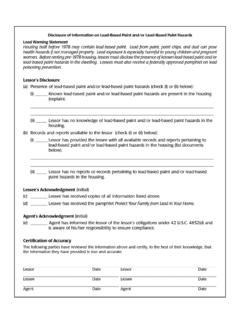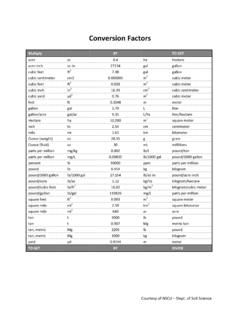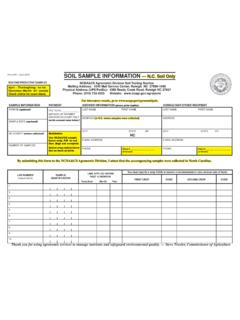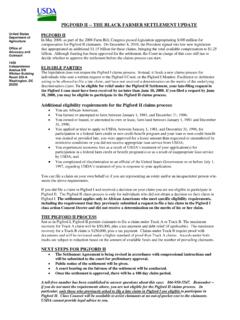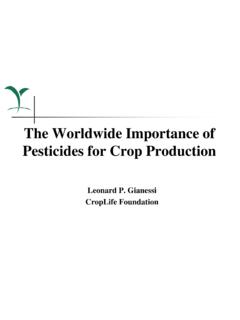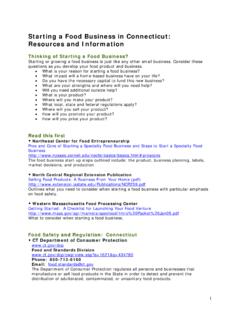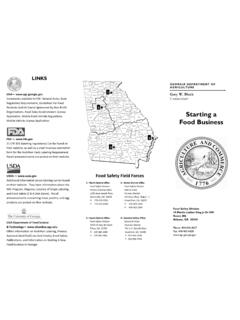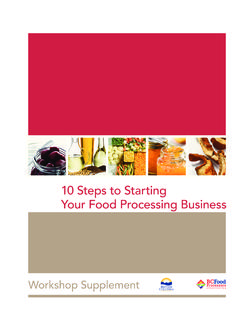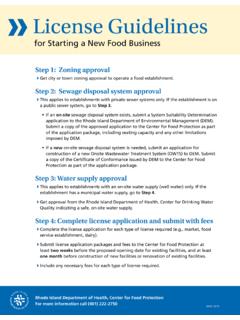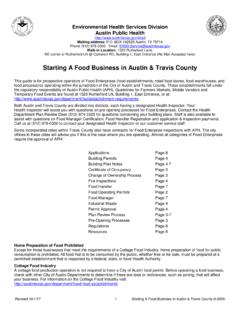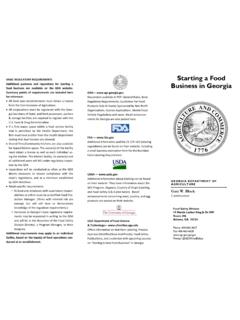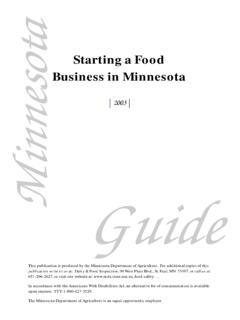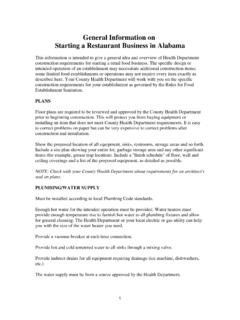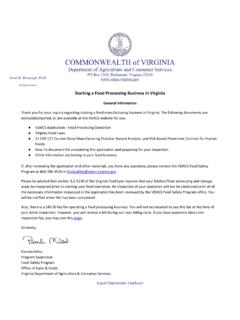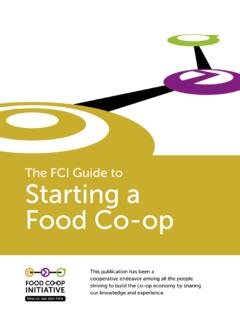Transcription of Information and Resources for Starting a Home-based Food ...
1 Information and Resources for Starting a Home-based food business This document provides useful Information to individuals interested in Starting a Home-based food business . The North Carolina Department of Agriculture & Consumer Services, food and Drug Protection Division helps Home-based food businesses comply with food safety laws and produce safe products for sale. Comprehensive Information about home processing and the required application materials are available through the NC Home Processing website at Questions about home processing can be e-mailed to Where can I get more Information about laws, regulations, and product safety? The NC Home Processing website includes links to the most current versions of state and federal food safety regulations, including: Code of Federal Regulations (21 CFR 110) also known as Good Manufacturing Practices (GMPs) Code of Federal Regulations (21 CFR 113) Thermally Processed Low-acid Foods Packaged in Hermetically Sealed Containers North Carolina food , Drug and Cosmetic Act Code of Federal Regulations (21 CFR 114) Acidified Foods ( pickles) Code of Federal Regulations (21 CFR 108) Emergency Permit Control Home-based food businesses should be aware of local laws and ordinances, including zoning and small business permitting.
2 Lists of local government contacts can be found at the following locations: County government links: City or town government links: More Information on labeling requirements is available from North Carolina State University s Department of food , Bioprocessing and Nutrition Science Extension Program. The Extension Program also provides pH and water activity testing services for certain categories of food products, including acidified foods such as pickles (pH testing), dressings/sauces (pH testing), and moist breads/cakes and some pies (water activity and pH). Contact the food and Drug Protection Division if you are uncertain whether your product requires testing. Where can I get help developing a business plan and marketing my product? The NC Home Processing website at provides Information about filing for a tax number, registering a business name, and applying for UPC codes for your product.
3 The NCDA&CS Marketing Division can provide additional help developing a business plan. For more Information , visit the Marketing Division website at The Marketing Division can help home processors build a web presence for their business through the NCDA&CS General Store, a directory of North Carolina agricultural goods and services. I m ready to submit my home processing application. Where should I send it? To submit a completed application, e-mail or mail to Kaye Snipes, 169 Boone Square St., #168, Hillsborough, NC 27278. The NC Home Processing website doesn t answer my question. How do I get more Information ? For general questions, e-mail If you do not use e-mail or for more specific inquiries, contact a member of the food and Drug Protection Division home processing staff: Sherry Batot food Regulatory Specialist (Central & Eastern NC) (919) 741-0361 Kaye Snipes food Regulatory Specialist (Piedmont & Western NC) (919) 608-9205 Compliance Staff NCDA&CS food and Drug Protection Division (919) 733-7366 Certain categories of baked goods Jams and jellies Candies Dried mixes Spices Certain sauces and liquids Pickles and acidified foods Checklist: Starting a Home-based food business Step 1: Verify that your product can be manufactured at home Low-risk packaged foods are the only products allowed to be manufactured in home kitchens.
4 These can include: High-risk products (such as refrigerated or frozen products, low-acid canned foods, dairy products, seafood products, and bottled water) must be made in a non-home based commercial facility. If you are uncertain whether your product can be made at home, contact a food Compliance Officer at 919-733-7366. Step 2: Verify that your home kitchen can be used to manufacture your product Step 3: Learn how to make your product safely and/or have your product analyzed for risk Home processing areas must meet state and federal safety requirements, including the Good Manufacturing Practices in the Code of Federal Regulations (21 CFR 110). Key requirements include: No pets in the home at any time, even if only at night Smooth and easily cleanable food contact surfaces Easily accessible restroom and hand-washing facilities with hot and cold running water Thermometer in refrigerator to monitor temperature Acceptable sewer or septic system for waste All kitchen light bulbs must be shatter-proof or shielded Step 4: Check with local authorities for licensing and zoning Information Step 5: Provide municipal water bill or have well water analyzed for coliform bacteria If you are manufacturing pickles or other acidified foods, plan to attend Better Process Control training of-fered by NC State University.
5 If you are unsure whether your product is low-risk, contact the NCSU food Science Department to have your product analyzed. If you have determined that you qual-ify as a Home-based business , check with your local government for infor-mation about local zoning and licens-ing requirements to ensure that a Home-based business is allowed in your neighborhood. If your home has municipal or city water, include a copy of your latest water bill with your application. Well water must be tested for coli-form bacteria before inspection. Test results within one year of your application are required. Testing is offered by private labs and some local health departments. Step 6: Develop your business plan Step 7: Label your product appropriately Step 8: Complete application for home processing inspection Provide a brief description of your business with your application.
6 The following items should be included: Detailed list of specific products produced in the home kitchen Ingredients and suppliers A plan for storing supplies, equipment, and finished product A general production flow including proce-dures and equipment A plan for transporting products Potential locations for sale of product All products sold to consumers must be packaged to prevent contamina-tion. Labels must be affixed to the package and include: Product name Manufacturer name and address Net weight of the product in ounces/pounds and the gram weight equivalent Complete list of ingredients in or-der of predominance by weight Within two weeks of receipt of your application, a food Regulatory Spe-cialist will contact you to arrange for a home processing facility inspec-tion.
7 You will receive a copy of rele-vant state and federal law. Inspec-tions are scheduled by e-mail. Check your e-mail periodically for correspondence from our Regula-tory Specialist. Applicants without e-mail will be contacted by phone. Step 9: Start your business and promote your product! After your product has been evaluated for risk and your kitchen has met inspection standards, you can begin producing and selling your product. You may want to file for a tax number, register your business name, or apply for one or more UPC codes. For more Information about growing your business and marketing your product, visit



